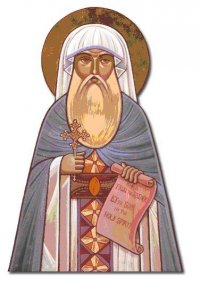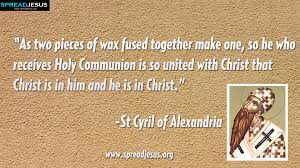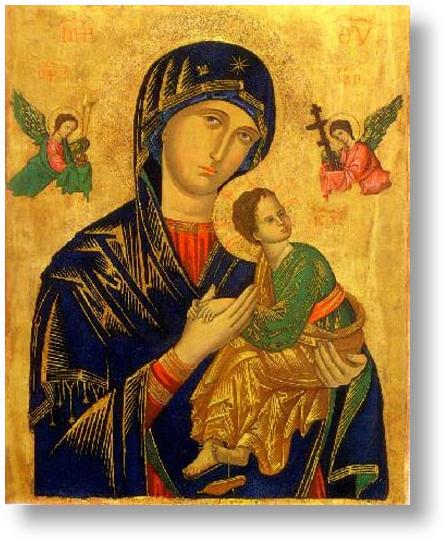
 Cyril of Alexandria was a man who loved the truth and did not suffer fools gladly. At a time when the very nature of Christ was being disputed and the future of the Church was at stake, Cyril defended vigorously the faith he felt he had received from previous generations.
Cyril of Alexandria was a man who loved the truth and did not suffer fools gladly. At a time when the very nature of Christ was being disputed and the future of the Church was at stake, Cyril defended vigorously the faith he felt he had received from previous generations.
Fr John Murray PP explains.
In those early centuries after the great events of the Lord’s life and resurrection, Christians lived their faith in the risen Christ under constant threat from the Roman empire and its allies. There were controversies of faith but the main threat came from without.
When things settled and the edict of Milan (AD 312) under Constantine gave the Church a measure of peace and stability, the attacks then came from within. The dust had hardly settled on the Church’s peace when a priest, Arius, questioned the nature of Christ. The great council of Nicea (325) began the orthodox response to him, but right through the 4th century orthodoxy was constantly challenged. Even Athanasius, who was exiled from his bishopric five times during the century, was heard to cry, ‘The whole world has become Arian.’
The Theological Issue
The issue of the nature of Christ had still not been resolved fully when Cyril was born in AD 376. He came from a clerical family, his uncle having been patriarch of Alexandria, and Cyril was to succeed him in 412. Athanasius had been the bishop or patriarch of the city for most of the previous century.
There were black marks against Cyril in those early years of his episcopacy. He expelled all the Jews from the city after a night of terror when some Christians had been killed. He had pillaged and closed the churches of the Novatian sect. However the key issue for which the Church honours Cyril is his defence of the nature of Christ. Cyril himself had used, though not invented, a word theotokos in his earlier writings, which he felt accurately conveyed the truth of Christ’s nature. The word could be translated as ‘Mother of God’, but the patriarch of Constantinople, one of the other great sees of the Eastern Church, had disagreed.
Nestorius believed that there were two separate persons in Christ; he held that Mary was the mother of the human person but not of the divine person. The Catholic teaching is that while in Christ there are two natures – divine and human – there is in Him only one person: a divine person, the second person of the Blessed Trinity.
 Mary gave birth according to the flesh to a divine person and therefore, she is the mother of God, though obviously she is not the mother of the divinity of God as God. Cyril naturally defended the orthodox teaching and urged Nestorius in a letter to recant.
Mary gave birth according to the flesh to a divine person and therefore, she is the mother of God, though obviously she is not the mother of the divinity of God as God. Cyril naturally defended the orthodox teaching and urged Nestorius in a letter to recant.
With the two most powerful bishops in the Eastern Church opposing each other, the Emperor Theodosius II called a council in AD 431 which met at Ephesus, then a flourishing seaport. The bishops met in the cathedral, the first in the world to be named St. Mary after the Blessed Virgin.
It is a pity that Cyril and Nestorius had not met earlier and discussed their differences in a more conciliatory way, but the impetuous Cyril even began proceedings without the arrival of the papal delegates. Nevertheless the council quickly condemned Nestorius.
The term Theotokos was upheld and the people of Ephesus celebrated by a tumultuous torchlight procession accompanying the bishops from the cathedral to their various residences throughout the town. To the people it meant a victory for Christ and for his mother.
 Cyril’s sermon at one of the Masses of the council had no doubt been influential in affecting the outcome of events. In bestowing on Mary this title of Theotokos he fully realized the importance for the faithful and the Church in succeeding generations as a whole.
Cyril’s sermon at one of the Masses of the council had no doubt been influential in affecting the outcome of events. In bestowing on Mary this title of Theotokos he fully realized the importance for the faithful and the Church in succeeding generations as a whole.
Here is an extract: ‘We salute you, Mary, for in your holy womb was confined him who is beyond all limitation. Because of you the Holy Trinity is glorified and adored; the cross is called precious and is venerated throughout the world; the heavens exult; the angels and the archangels make merry; the demons are put to flight; the devil is thrust down from heaven; the fallen race of man is taken up on high; believers receive holy baptism; the oil of gladness is poured out; the Church is established throughout the world.
‘Who can put Mary’s high honour into words? She is both mother and virgin. I am overwhelmed by the wonder of this miracle. Of course, no one could be prevented from living in the house he had built himself, yet who would invite mockery by asking his own servant to become his mother? To Him be glory for ever and ever. Amen.’
Cyril continued to guide the Church in Alexandria for another thirteen years and died in the year 444 with a prayer to Mary on his lips. His feast day in the West is kept on 27 June.
This article first appeared in The Messenger (June 2008), a publication of the Irish Jesuits.
____________________________________
******************************
Memorable Sayings for Today
“Never be afraid of loving the Blessed Virgin too much.
You can never love her more than Jesus did.”
~ St Maximilian Kolbe ~
******************************